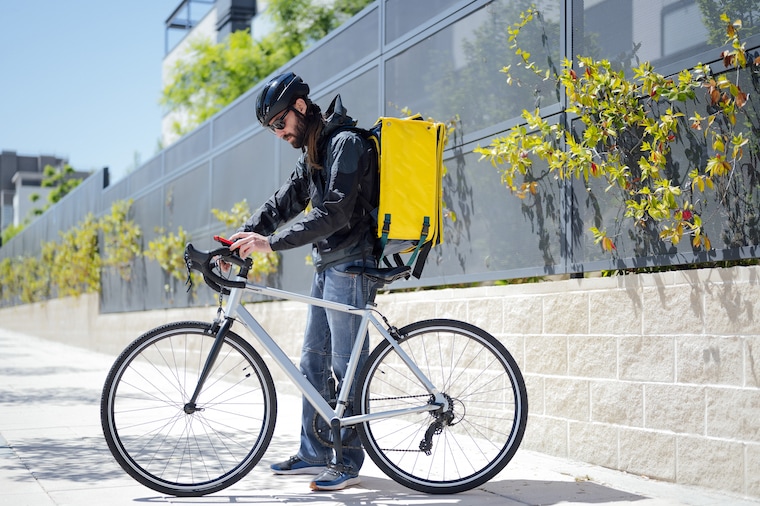Buying equipment and supplies for courier business?
Buying equipment and supplies for a courier business is a critical step in starting and running a successful courier service. Whether you are just starting or looking to upgrade your existing equipment, investing in the right tools and supplies can make all the difference. In this article, we will cover the essential equipment and supplies needed for a courier business to ensure you have everything you need to operate efficiently and effectively.

Vehicles for Courier Business
One of the most important aspects of a courier business is the vehicle you use for deliveries. Choosing the right vehicle is critical to ensuring you can meet the needs of your customers while keeping costs low. There are a variety of options available, including:
Cars – If you are just starting, a car can be an affordable option for making deliveries. You can purchase a reliable used car or lease a new one, depending on your budget.
Vans – If you plan on delivering larger items, a van can be a great choice. Vans provide more cargo space than cars, making it easier to transport larger packages.
Trucks – If you plan on delivering heavy items, a truck may be necessary. However, trucks can be expensive to operate and maintain, so consider your budget before investing in one.
Regardless of the vehicle you choose, it’s important to keep it well-maintained to ensure it’s always in good condition and ready for deliveries.
Delivery Bags and Boxes
The next essential equipment for a courier business is delivery bags and boxes. These are used to transport and protect items during delivery, ensuring they arrive at their destination safely. There are a variety of options available, including:
Messenger bags – These are ideal for carrying smaller items and documents. Messenger bags are lightweight and easy to carry, making them a great option for bike couriers.
Backpacks – Backpacks are another great option for carrying smaller items. They offer more space than messenger bags and are more comfortable to wear for extended periods.
Boxes – For larger items, boxes are the way to go. Cardboard boxes are the most common option and come in a variety of sizes to fit different items. Consider investing in bubble wrap or packing peanuts to keep items protected during transit.
GPS and Tracking Devices
GPS and tracking devices are essential for a courier business. These devices help you keep track of your vehicles and ensure your deliveries are made on time. There are a variety of options available, including:
GPS devices – These devices provide real-time tracking of your vehicles, allowing you to monitor their location and status.
Smartphone apps – Many courier companies use smartphone apps to track their deliveries. These apps can be used to assign deliveries, track the status of each delivery, and communicate with drivers.
Electronic signature capture – Electronic signature capture devices allow you to capture signatures from customers when delivering items. This helps to ensure that items are delivered to the correct person and provides proof of delivery.
Safety Equipment
Safety should always be a top priority when running a courier business. Investing in the right safety equipment can help protect your drivers and ensure that deliveries are made safely. Some essential safety equipment includes:
Reflective vests – These vests make drivers more visible to other drivers, especially at night or in low-light conditions.
First aid kits – A first aid kit is essential for dealing with any accidents or injuries that may occur on the job.
Fire extinguishers – In the event of a fire, having a fire extinguisher on hand can help prevent serious damage or injuries.
Marketing and Promotional Materials
Finally, investing in marketing and promotional materials can help you grow your courier business. Some effective marketing materials include:
Business cards – Business cards are a great way to promote your business and provide customers with your contact information.
Brochures – Brochures can be used to provide more detailed information about your services and highlight your competitive advantages.
Website – A website is essential for any modern business, including courier services. Your website should be optimized for search engines and include information about your services, pricing, and contact information.
Social media – Social media can be a powerful tool for marketing your courier business. Platforms like Facebook, Instagram, and Twitter allow you to connect with potential customers and promote your services.
Choosing the Right Equipment and Supplies
When choosing equipment and supplies for your courier business, it’s important to consider your specific needs and budget. Take the time to research your options and compare prices to ensure you get the best value for your money.
In addition to the equipment and supplies mentioned above, there are a few other factors to consider when starting a courier business. These include:
Insurance – Insurance is essential for protecting your business and your assets. Make sure you have the right coverage for your vehicles, employees, and property.
Regulations – Depending on where you operate, there may be regulations and permits you need to obtain before starting your business. Make sure you are familiar with any local laws or regulations that apply to your business.
Pricing – Pricing is a critical factor in the success of any courier business. Make sure you set your prices competitively while still ensuring you make a profit.
Conclusion
Starting and running a successful courier business requires careful planning and investment in the right equipment and supplies. By choosing the right vehicles, delivery bags and boxes, GPS and tracking devices, safety equipment, and marketing materials, you can set your business up for success. Remember to consider your specific needs and budget when making your decisions, and always prioritize safety and customer satisfaction.
FAQ
There are a few different types of vehicles that are suitable for a courier business, depending on the types of packages and deliveries you plan to make. Some of the most common options include cars, vans, and trucks. Cars are ideal for making smaller deliveries, while vans and trucks are better suited for larger packages. Ultimately, the type of vehicle you choose will depend on your specific needs and budget.
To run a successful courier business, you will need a few essential pieces of equipment, including delivery bags and boxes, GPS and tracking devices, safety equipment such as reflective vests and first aid kits, and marketing materials such as business cards and brochures. The equipment you need will depend on the size and scope of your business.
One of the most important factors in running a successful courier business is ensuring that your deliveries arrive safely and on time. To do this, you should invest in high-quality delivery bags and boxes to protect items during transit, use GPS and tracking devices to monitor your vehicles and ensure they take the most efficient routes, and make sure your drivers are trained in safe driving practices.
Marketing your courier business is essential to attract new customers and grow your business. Some effective marketing strategies include creating a website that is optimized for search engines, using social media to connect with potential customers, and attending local networking events to meet potential clients.
Choosing the right suppliers for your courier business is critical to ensuring that you have the equipment and supplies you need to operate efficiently. When choosing suppliers, look for companies that offer high-quality products at competitive prices, have a good reputation in the industry, and offer reliable customer service and support. It’s also a good idea to read reviews and get recommendations from other courier business owners to find the best suppliers for your needs.

